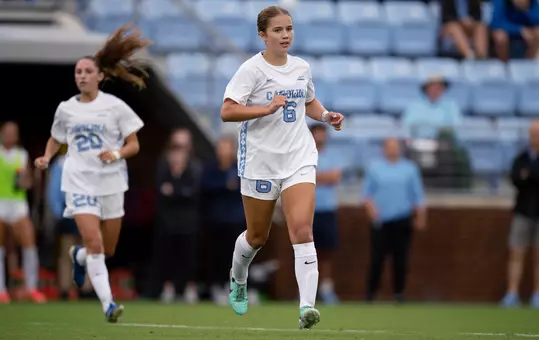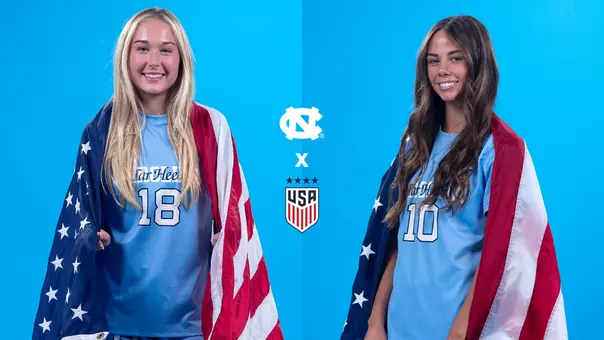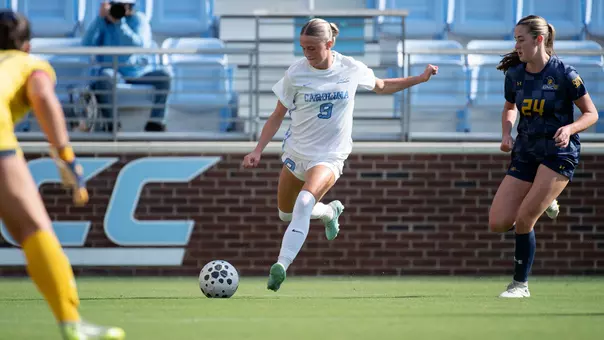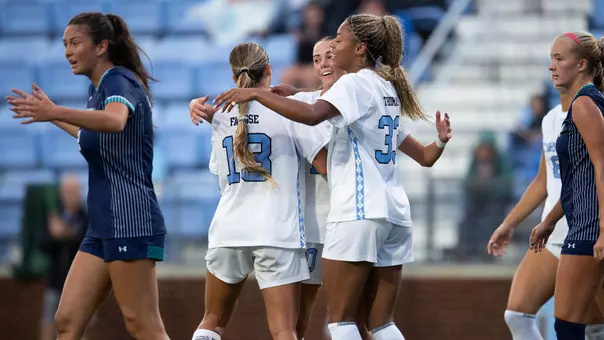University of North Carolina Athletics
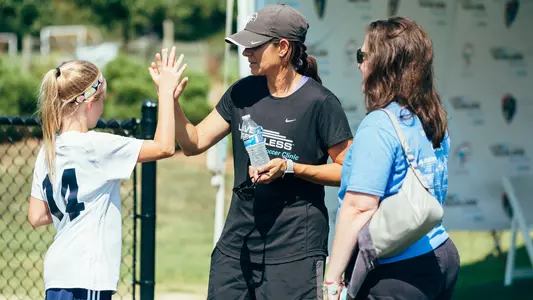
Mia Hamm returned to the Triangle for the Live Fearless Soccer Clinic.
GoHeels Exclusive: Q&A With Mia Hamm
September 14, 2017 | Women's Soccer, Featured Writers
by Pat James, GoHeels.com
It's been 24 years since Mia Hamm played her final match for the North Carolina women's soccer team, a 6-0 win over George Mason in the 1993 NCAA championship. But her ties to UNC still run deep.
In August, Hamm and former Tar Heels Kristine Lilly and Tisha Venturini Hoch, founders of Team First Soccer Academy, returned to the Triangle for the Blue Cross and Blue Shield of North Carolina Live Fearless Soccer Clinic in Raleigh.
Following the clinic, Hamm spoke with GoHeels.com columnist Pat James about the event, her time playing for UNC and what the University still means to her.
Q: How did the Live Fearless Soccer Clinic come about?
Mia Hamm: Blue Cross Blue Shield came in and was a part of my annual golf tournament I do at UNC, and they also started this "Live Fearless" campaign and they were looking for ambassadors … Through the talks, we had talked about Team First and how former Tar Heels Kristine Lilly, Tisha Venturini and I did this camp all across the country. And they thought it was a great way to activate this campaign because they really talk about getting these young girls to kind of get outside their comfort zone, which is a message we share at our Team First camps and clinics. Basically, don't worry about being evaluated. We're here just to share our love and passion for the game and make you better. Understand you're in a safe environment so be willing to take risks and don't worry about messing up and be fearless in this opportunity. It just was a natural fit with that. So this past August was our third year teaming up with them, and we had about 150 girls from 8-12 and a majority were selected based on high standards of sportsmanship in their different leagues. We always love being able to come back. But basically being able to come back and really impact the community means a lot to the three of us.
Q: How would you say the clinic has grown and transformed over three years?
MH: I think, one, just in term of our organization, it's just a cleaner event. But I think the word has really spread in terms of the enthusiasm that kind of goes along with it. That's important for us because for the three of us, whether it's doing these Live Fearless Soccer clinics or it's doing our own Team First events all over the country, we're invested. It's our curriculum. We're on the field for every second of every drill that's being done, and in the end, we want these young women to know that we're committed to being a part of whether it's these four hours or these two days because we understand the investment people made in us, just how much it impacted our lives. So hopefully they walk away just having more confidence in themselves. It doesn't have to do with soccer. If they feel inspired to maybe step outside their comfort zone in school or in another extracurricular activity they weren't really sure of and kind of follow a passion of theirs, then we feel we've had a positive impact on them.
Q: Out of the several stops you make each year, does the Live Fearless Soccer Clinic mean a little bit more to you since it's near UNC?
MH: First of all, I'm lucky enough to be able to come back every year. But Tisha hadn't been back in probably five years, and she couldn't believe the amount of growth and renovations they had done on campus. It's so great to come back and see our former coaches. We have friends who live in the area and just reconnect with them. What ties us all together is Carolina, this special place where we all shared so many great memories. To be able to do that and also bring back our kids and whisper in their ears, 'Hey, would love for you guys to go to Carolina.' It's another reason for us to come back multiple times a year. Because for me, when I go there, it's about the people and that connection. I've been to a lot of different campuses all over the country, and to me, it's still the most beautiful campus that I've been to.
Q: What is it that still makes UNC so special to you?
MH: I think the people that both continue to be in my life and were in my life when I was in school there. I think it's a tremendous sense of pride for me. Going back, my coaches and my friends were such an integral part of my life at a very important period of growth and development. To have a lot of those people still involved and now having such a wonderful impact on my kids is special to me. It's nice to be able to go back. We were lucky enough about five or six years ago to live there for a year and a half. So my daughters were able to spend a good year and a half there and my son right after he was born. It was just wonderful to be in a college environment. To see my young daughters go to a women's soccer game or women's lacrosse game and look up to these players, it's just great they have these role models.
Q: How close are you still to those people at UNC, specifically Anson Dorrance?
MH: Incredibly close. I love coming back every year. I feel like we pick up where we left off in terms of sharing information, giving each other grief occasionally, especially on the golf course. Bill Palladino, the assistant, going over and grilling out at his house and seeing his wife (Wendy Gebauer Palladino), who was a grad assistant my freshman year and I played with on the U.S. women's national team. Cindy Parlow Cone lives there and Carla Overbeck. To see their families and be a part of that. The director of my foundation lives there, Michelle Brunner and her family. So I have a lot of very deep ties still there.
Q: Looking back at when you first met Dorrance, could you have envisioned everything that followed in your soccer career and the relationship you formed with him?
MH: No. I say that not because, it has nothing to do with him but more about me. I kind of live day-by-day. I try to create long-term goals, but in the end, for me, I'm so intense that it takes kind of all my energy just to focus on the task at hand. But I'm just incredibly grateful for his influence and continued influence in my life. I know he had to show a lot of patience in helping me understand kind of my own potential but also that I had to be consistently invested in my own development. It couldn't just be him saying, 'Hey, I think you're great. I'm going to put all of these great players around you.' I had to really commit to being a better player. Physically, being fitter and stronger. And tactically, understanding the game and really being a student. And technically, working both during practice and on my own and making that commitment consistently. I think those lessons but doing it in a way that really kind of pushed me. Everyone is different in terms of how they're motivated. That's one of the gifts he and Bill Palladino have is they're just able to manage all of those different personalities and really take the time to figure out how each person, whether it's how they're spoken to or the challenges you put in front of them, is going to respond.
Q: As the years have gone by, have you gained an even greater appreciation for your time in Chapel Hill?
MH: Oh, yeah. One, just how special it was. We came back last year and talked to some of the players, and we just said, "It goes by so fast. And this is such a special place and special time in your life that you're going to look back on and go, 'Oh, my gosh, I should have done this.' You're going to create lasting friendships from this university and especially from the program because you endure so much." It's like a family. Whether it's on road trips or at practice, you kind of really see every side of people and you see that vulnerability and how you can trust those players to handle that and to take care of that and trust each other, saying, "Hey, listen, yeah, you just yelled at me for not doing my job. But I still care about you and I'm still invested in making both of us better." Huge impact, continued impact in my life.
Q: What is your favorite memory from your time at UNC?
MH: If it's different road trips or national championships, I remember my junior year (in 1992) was a pretty special year. I thought our team was so dynamic and so talented. And it was just fun. Every single day, practice was so much fun because we worked extremely hard. That was the thing that I don't think a lot of people, especially our opponents, realized. Yeah, we had Tisha Venturini and Angela Kelly in the center of our midfield and up top was Kristine, myself and Rita Tower and our defense. We were just loaded all over the place, but we went after it in practice. We set such high standards for ourselves. So when we stepped on the field to play a game, it was just fun. I'd probably say that national championship where we beat Duke 9-1.
Q: What kind of UNC fan are you these days?
MH: I follow a lot of the Twitter pages, so I'm able to stay on top of that. When the basketball is on, or women's soccer, if I'm able to stream it, I will. But a lot of the time with my kids, it's hard on weekends. But no, I keep track of as much as I can that's going on and cheer for them, making sure every year my kids, if they've outgrown their last round of Carolina gear, that they have a new set. I'll be coming out, I think in about two weeks, for my golf tournament. So it will be about time to get new T-shirts and shorts for the kids.
Q: How much are you looking forward to the new soccer stadium?
MH: I think, one, it was one of those things that probably should have been done a long time ago. It's great to see it finally happening, not just for the programs – both men's and women's soccer and men's and women's lacrosse – but for Anson. I think he's set such a standard and has taken not just the collegiate game but the game of soccer all over the world to a new level. He pretty much set the standard for us globally of how the game was going to be played and the commitment. I'm just excited for him and happy for the University because this is a historic program that deserves to have a venue like this. And then you see the programs, the men's soccer team, which has won the national championship, and men's and women's lacrosse, which have. This is vital to continue to build those programs going forward as well as women's soccer, to compete with especially a lot of the SEC programs that have their own stadiums. I think, one, it's just the right thing to do for everything he has done for the University and the game. But also, it's important for our athletic department.
It's been 24 years since Mia Hamm played her final match for the North Carolina women's soccer team, a 6-0 win over George Mason in the 1993 NCAA championship. But her ties to UNC still run deep.
In August, Hamm and former Tar Heels Kristine Lilly and Tisha Venturini Hoch, founders of Team First Soccer Academy, returned to the Triangle for the Blue Cross and Blue Shield of North Carolina Live Fearless Soccer Clinic in Raleigh.
Following the clinic, Hamm spoke with GoHeels.com columnist Pat James about the event, her time playing for UNC and what the University still means to her.
Q: How did the Live Fearless Soccer Clinic come about?
Mia Hamm: Blue Cross Blue Shield came in and was a part of my annual golf tournament I do at UNC, and they also started this "Live Fearless" campaign and they were looking for ambassadors … Through the talks, we had talked about Team First and how former Tar Heels Kristine Lilly, Tisha Venturini and I did this camp all across the country. And they thought it was a great way to activate this campaign because they really talk about getting these young girls to kind of get outside their comfort zone, which is a message we share at our Team First camps and clinics. Basically, don't worry about being evaluated. We're here just to share our love and passion for the game and make you better. Understand you're in a safe environment so be willing to take risks and don't worry about messing up and be fearless in this opportunity. It just was a natural fit with that. So this past August was our third year teaming up with them, and we had about 150 girls from 8-12 and a majority were selected based on high standards of sportsmanship in their different leagues. We always love being able to come back. But basically being able to come back and really impact the community means a lot to the three of us.
Q: How would you say the clinic has grown and transformed over three years?
MH: I think, one, just in term of our organization, it's just a cleaner event. But I think the word has really spread in terms of the enthusiasm that kind of goes along with it. That's important for us because for the three of us, whether it's doing these Live Fearless Soccer clinics or it's doing our own Team First events all over the country, we're invested. It's our curriculum. We're on the field for every second of every drill that's being done, and in the end, we want these young women to know that we're committed to being a part of whether it's these four hours or these two days because we understand the investment people made in us, just how much it impacted our lives. So hopefully they walk away just having more confidence in themselves. It doesn't have to do with soccer. If they feel inspired to maybe step outside their comfort zone in school or in another extracurricular activity they weren't really sure of and kind of follow a passion of theirs, then we feel we've had a positive impact on them.
Q: Out of the several stops you make each year, does the Live Fearless Soccer Clinic mean a little bit more to you since it's near UNC?
MH: First of all, I'm lucky enough to be able to come back every year. But Tisha hadn't been back in probably five years, and she couldn't believe the amount of growth and renovations they had done on campus. It's so great to come back and see our former coaches. We have friends who live in the area and just reconnect with them. What ties us all together is Carolina, this special place where we all shared so many great memories. To be able to do that and also bring back our kids and whisper in their ears, 'Hey, would love for you guys to go to Carolina.' It's another reason for us to come back multiple times a year. Because for me, when I go there, it's about the people and that connection. I've been to a lot of different campuses all over the country, and to me, it's still the most beautiful campus that I've been to.
Q: What is it that still makes UNC so special to you?
MH: I think the people that both continue to be in my life and were in my life when I was in school there. I think it's a tremendous sense of pride for me. Going back, my coaches and my friends were such an integral part of my life at a very important period of growth and development. To have a lot of those people still involved and now having such a wonderful impact on my kids is special to me. It's nice to be able to go back. We were lucky enough about five or six years ago to live there for a year and a half. So my daughters were able to spend a good year and a half there and my son right after he was born. It was just wonderful to be in a college environment. To see my young daughters go to a women's soccer game or women's lacrosse game and look up to these players, it's just great they have these role models.
Q: How close are you still to those people at UNC, specifically Anson Dorrance?
MH: Incredibly close. I love coming back every year. I feel like we pick up where we left off in terms of sharing information, giving each other grief occasionally, especially on the golf course. Bill Palladino, the assistant, going over and grilling out at his house and seeing his wife (Wendy Gebauer Palladino), who was a grad assistant my freshman year and I played with on the U.S. women's national team. Cindy Parlow Cone lives there and Carla Overbeck. To see their families and be a part of that. The director of my foundation lives there, Michelle Brunner and her family. So I have a lot of very deep ties still there.
Q: Looking back at when you first met Dorrance, could you have envisioned everything that followed in your soccer career and the relationship you formed with him?
MH: No. I say that not because, it has nothing to do with him but more about me. I kind of live day-by-day. I try to create long-term goals, but in the end, for me, I'm so intense that it takes kind of all my energy just to focus on the task at hand. But I'm just incredibly grateful for his influence and continued influence in my life. I know he had to show a lot of patience in helping me understand kind of my own potential but also that I had to be consistently invested in my own development. It couldn't just be him saying, 'Hey, I think you're great. I'm going to put all of these great players around you.' I had to really commit to being a better player. Physically, being fitter and stronger. And tactically, understanding the game and really being a student. And technically, working both during practice and on my own and making that commitment consistently. I think those lessons but doing it in a way that really kind of pushed me. Everyone is different in terms of how they're motivated. That's one of the gifts he and Bill Palladino have is they're just able to manage all of those different personalities and really take the time to figure out how each person, whether it's how they're spoken to or the challenges you put in front of them, is going to respond.
Q: As the years have gone by, have you gained an even greater appreciation for your time in Chapel Hill?
MH: Oh, yeah. One, just how special it was. We came back last year and talked to some of the players, and we just said, "It goes by so fast. And this is such a special place and special time in your life that you're going to look back on and go, 'Oh, my gosh, I should have done this.' You're going to create lasting friendships from this university and especially from the program because you endure so much." It's like a family. Whether it's on road trips or at practice, you kind of really see every side of people and you see that vulnerability and how you can trust those players to handle that and to take care of that and trust each other, saying, "Hey, listen, yeah, you just yelled at me for not doing my job. But I still care about you and I'm still invested in making both of us better." Huge impact, continued impact in my life.
Q: What is your favorite memory from your time at UNC?
MH: If it's different road trips or national championships, I remember my junior year (in 1992) was a pretty special year. I thought our team was so dynamic and so talented. And it was just fun. Every single day, practice was so much fun because we worked extremely hard. That was the thing that I don't think a lot of people, especially our opponents, realized. Yeah, we had Tisha Venturini and Angela Kelly in the center of our midfield and up top was Kristine, myself and Rita Tower and our defense. We were just loaded all over the place, but we went after it in practice. We set such high standards for ourselves. So when we stepped on the field to play a game, it was just fun. I'd probably say that national championship where we beat Duke 9-1.
Q: What kind of UNC fan are you these days?
MH: I follow a lot of the Twitter pages, so I'm able to stay on top of that. When the basketball is on, or women's soccer, if I'm able to stream it, I will. But a lot of the time with my kids, it's hard on weekends. But no, I keep track of as much as I can that's going on and cheer for them, making sure every year my kids, if they've outgrown their last round of Carolina gear, that they have a new set. I'll be coming out, I think in about two weeks, for my golf tournament. So it will be about time to get new T-shirts and shorts for the kids.
Q: How much are you looking forward to the new soccer stadium?
MH: I think, one, it was one of those things that probably should have been done a long time ago. It's great to see it finally happening, not just for the programs – both men's and women's soccer and men's and women's lacrosse – but for Anson. I think he's set such a standard and has taken not just the collegiate game but the game of soccer all over the world to a new level. He pretty much set the standard for us globally of how the game was going to be played and the commitment. I'm just excited for him and happy for the University because this is a historic program that deserves to have a venue like this. And then you see the programs, the men's soccer team, which has won the national championship, and men's and women's lacrosse, which have. This is vital to continue to build those programs going forward as well as women's soccer, to compete with especially a lot of the SEC programs that have their own stadiums. I think, one, it's just the right thing to do for everything he has done for the University and the game. But also, it's important for our athletic department.
Mack Brown On-Court Recognition - February 23, 2026
Thursday, February 26
UNC Baseball: Paulsen Homers Twice in 13-3 Win vs VCU
Thursday, February 26
THE ARENA DISCUSSION - Episode 1: Lee Roberts & Bubba Cunningham
Wednesday, February 25
UNC Baseball: Hull, Schaffner Lift Tar Heels Over NC A&T, 9-1
Tuesday, February 24











